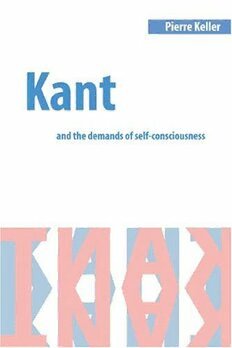
Kant and the Demands of Self-Consciousness PDF
296 Pages·2001·1.167 MB·English
Most books are stored in the elastic cloud where traffic is expensive. For this reason, we have a limit on daily download.
Preview Kant and the Demands of Self-Consciousness
Description:
Pierre Keller examines Kant's theory of self-consciousness and argues that it succeeds in explaining how both subjective and objective experience are possible. He argues for a new understanding of Kant's conception of self-consciousness as the capacity to abstract not only from what one happens to be experiencing, but also from one's own personal identity. By developing this new interpretation he is able to argue that transcendental self-consciousness underwrites a general theory of objectivity and subjectivity at the same time.
See more
The list of books you might like
Most books are stored in the elastic cloud where traffic is expensive. For this reason, we have a limit on daily download.
